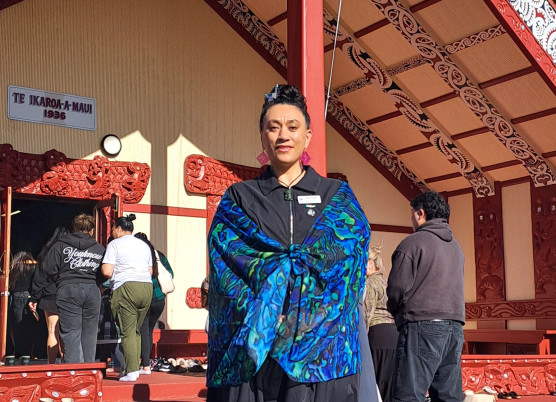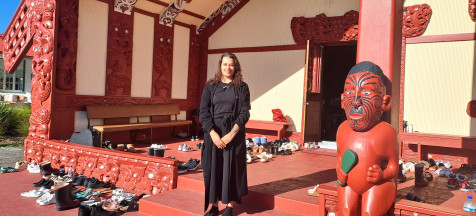Māori student nurses’ hui explores leadership in health
WITT nursing ākonga Billie-Jean James says cultural competence is closely linked to health literacy and better health outcomes for Māori.
Billie-Jean (Ngā Rauru, Ngāti Ruanui, Ngā Ruahine, Taranaki) spoke at a recent hui of the power of sharing karakia with Māori patients she encountered while on a range of placements, including surgical, mental health and drug addiction services.
“In my second-year surgical placement, I met a kaumātua awaiting major surgery. As the anaesthetist arrived, the kaumātua quietly asked: ‘Can we do a karakia?’ I paused. Nurses were rushing. Time was tight. But I advocated without hesitation and said to staff; ‘Give us two minutes.’ We did the karakia. His moko later came to me and said with tears in her eyes: ‘You saw my koro. You really saw him, thank you’.”
The third-year Bachelor of Nursing student shared her experience as part of her exemplar presentation to 200 fellow nurses from all over Aotearoa gathered for the recent National Māori Student Nurses Hui hosted by WITT at Owae Marae in Waitara.
Organised by WITT’s working group under the auspices of Te Kaunihera o Ngā Neehi Māori (National Council of Māori Nurses), the four-day event was part of a tradition that began in 1986 when the first national hui for Māori nurses was held at Ratana Pa.
The aim of the hui was to bring together Māori nurses within an environment strengthening Māori identity and offering experience of what it is to be Māori – a right under Te Tiriti o Waitangi. With a strong focus on encouraging more Māori into nursing, the hui reflects the core kaupapa of the council, set up in 1983 in response to concern that Māori patients were not receiving appropriate hospital care – a situation exacerbated by a shortage of Māori nurses.
The hui programme included sessions on cultural safety and Te Tiriti o Waitangi, and Ao mai t era – Courageous Conversations, as well as student exemplar presentations, key competency activities, guest speakers and the selection of a new student representative on the national council.

Caption: Billie-Jean James
Clinical care and karakia all in the kete
Billie-Jean addressed the hui theme of Leadership in Rangitira Hauora (Māori Health Leadership) in her exemplar, Weaving Cultural Competence into Nursing Practice.
An exemplar is a story about one’s practice, a significant learning experience taken from clinical experience, case study or assignment. Exemplars are an opportunity to share learnings with peers and for peers to learn from other’s experiences.
Among her reflections, Billie-Jean said, “Cultural competence isn’t something you tick off on a checklist. It’s not just knowing a few words in te reo Māori or attending a marae visit during your first year.”
“For me, cultural competence is a way of being — it’s the awareness that who I am as a Māori nursing student influences the space I create for others. It’s about being present, listening deeply, and respecting the lived realities of those we serve. It’s also about discomfort — challenging what we think we know and being willing to sit in spaces of uncertainty as we grow.”
Reflecting on the practise of tikanga in health settings, she’s realised that “clinical skill and cultural competence are not separate — they are threads of the same kete.”

Caption: Morgan Bergelsdyk
More Māori in health workforce
Outgoing national student nurse rep Morgan Bergelsdyk (Ngāti Kahungunu), in her final year of Bachelor of Nursing at UCOL, said top issues she’s worked on include continued support for Māori nursing students to embrace their cultural identity as health practitioners within the health system.
Another issue is the rise in te reo by nursing ākonga but a lack of framework and assessors with language proficiency to assess them.
“We are currently seeing the kohanga reo generation coming through – and they are now at the stage of submitting essays in full te reo Māori. But universities and wananga don’t have capacity to mark it. There are markers who can read Māori language but because there’s no formal Māori nursing – they don’t understand the context.”
She’s noted more Māori are entering the health workforce because “their whānau are missing out on GP appointments, so they’re sitting in ED for 12 hours instead. They [Maori nurses] are like: ‘what do we need to do to change that?’ And with hikoi (against the Treaty Principles Bill in Wellington) they are feeling empowered and they’re wanting to take charge of the health of their own whānau.”
Hui highlights
Allana Prestney (Ngāti Toa, Ngāti Raukawa, Te Atiawa) - Lead Kaitakawaenga Māori and Pasifika – says the hui was a great success. “It was spearheaded by a small collection of WITT Kaimahi to bring the Kaupapa of the hui - Rangatiratanga in Hauora (Leadership in Health) - with a focus on prominent Taranaki Tupuna Maui Pomare and Te Rangihiroa.”
“Ākonga worked together in their mixed roopu (groups) to affect their learnings in activities that cemented for them the importance of being Māori and how this can be advantageous for them unapologetically. It’s about being strong enough to be the voice that can be heard for the benefit of all.”
She says 24 nursing ākonga from WITT left the hui feeling “more comfortable to be Māori in the Hauora (health and wellbeing) space and how they can effectively make a difference. Opportunities like this enhances learning for our ākonga and are invaluable as they continue their nursing journey.”
Caption: (top) WITT Māori student nurses at the recent national hui at Owae Marae, Waitara.